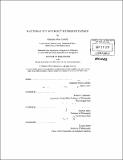Rationality without representation
Author(s)
Pérez Carballo, Alejandro
DownloadFull printable version (6.587Mb)
Other Contributors
Massachusetts Institute of Technology. Dept. of Linguistics and Philosophy.
Advisor
Robert C. Stalnaker and Stephen Yablo.
Terms of use
Metadata
Show full item recordAbstract
This dissertation is about whether and how non-representational attitudes could play a role in our theories of rationality. In Chapter 1 ('Negation, expressivism, and intentionality') I argue that the best explanation for why two mental states are inconsistent need not presuppose that such states are representational-that they have, in the jargon, truth-conditions. I use this to provide a solution to the 'negation problem' for metaethical expressivism. In Chapter 2 ('Structuring logical space') I sketch an account of mathematical practice along non-representational lines. I show how it can do justice to the applicability of mathematics, and propose ways in which one's epistemic goals can impose substantial constraints on which mathematical theories to accept. Chapter 3 ('Good questions') provides a general account of the way in which rationality constrains changes in our hypothesis space. In particular, I show how some such changes can be better than others by placing the discussion within a general framework of rational dynamics, on which rational epistemic change involves maximizing expected epistemic utility.
Description
Thesis (Ph. D.)--Massachusetts Institute of Technology, Dept. of Linguistics and Philosophy, 2011. Cataloged from PDF version of thesis. Includes bibliographical references (p. 103-109).
Date issued
2011Department
Massachusetts Institute of Technology. Department of Linguistics and PhilosophyPublisher
Massachusetts Institute of Technology
Keywords
Linguistics and Philosophy.